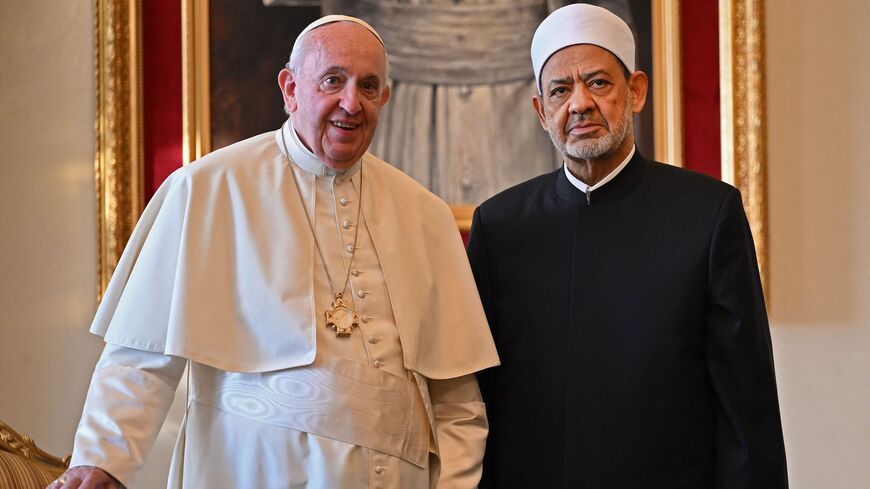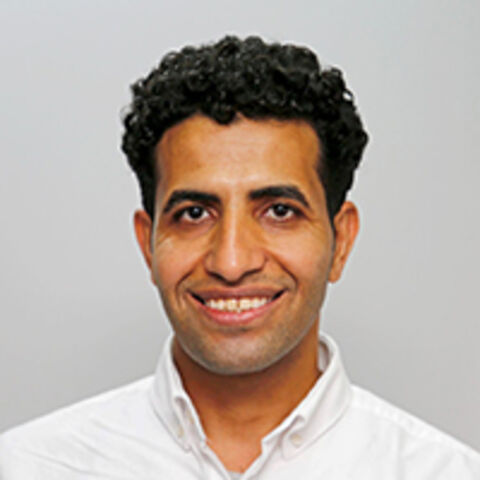CAIRO — The head of the Roman Catholic Church, Pope Francis, and the Grand Imam of Al-Azhar, Ahmed el-Tayeb, have received an official invitation from the United Nations Security Council to each deliver a historic speech during its meeting in June in New York, Al-Monitor has learned.
An Egyptian clerical source told Al-Monitor that the speeches of the prominent religious leaders will be delivered before a high-level session of the council dubbed, “The Importance of Human Fraternity Values in Promoting and Sustaining Peace,” due in mid-June at the UN’s headquarters.
"The United Arab Emirates [which will be holding the Security Council’s presidency] will highlight pressing and urgent humanitarian issues and try to take serious steps toward establishing security and ending conflicts around the world,” the invitation states.
The two religious leaders will confirm their attendance this month, the source told Al-Monitor on condition of anonymity.
“They [the two leaders] are used to supporting any step that can promote peace in the world, so their attendance could help solve crises and stop wars around us,” the source added.
The historic speeches will come at a time the world is witnessing unending quarrels, fights and wars. The war in Ukraine has entered its second year and the latest fighting in Sudan could destabilize the fragile situation in Central, North and West Africa.
Moncef Slimi, a political analyst on Arab and European affairs and head of the German-Maghreb Institute for Culture and Media, told Al-Monitor that it would be the first time the Security Council hosts two religious leaders as prominent as Pope Francis and Sheikh Tayeb.
“That would be an important political and moral message at a difficult time for the world, both in the Arab world where wars are raging, most recently in Sudan, as well as in the West, where Ukraine's war continues unabated,” he said.
In January 2011, relations between Al-Azhar and the Vatican were severed against the backdrop of remarks made by Pope Benedict XVI on Islam and Muslims, which were interpreted by some in Egypt as accusing Muslims of persecuting adherents of other religions in the Middle East and calling for intervention to protect them.
However, Tayeb's visit — who is known as a moderate and centrist religious leader — to the Vatican and his first meeting with Pope Francis in May 2016 ushered in a new era for Al-Azhar and the Vatican. The meeting motivated Pope Francis’ trip to Egypt in 2017.
Since then, nine meetings between the grand imam and the pope have taken place.
In February 2019, the two leaders signed the “Document on Human Fraternity,” which they presented to the world in Abu Dhabi. One year later, the UN General Assembly adopted the document and called on the international community to observe Feb. 4 as the annual “International Day of Human Fraternity.”
Father Rafic Greiche, supervisor of Le Messager Catholic weekly newspaper and secretary of the Information Committee for the Catholic Church in Egypt, told Al-Monitor that the invitation to deliver a speech at the UN comes as the culmination of the same process that led to the signing of the historical Document on Human Fraternity.
He said that the UN has formed an international committee consisting of some heads of churches and Islamic institutions to engage in dialogue with governments to mainstream the principles contained in the historic document, which calls for an end to religious-based hatred and extremism.
He added that Pope Francis has sought to consolidate peace diplomacy since he was appointed head of the Catholic Church in 2013. He has also led many dialogues with leaders of churches and Islamic institutes that have helped strengthen relations between Christians and Muslims, according to Greiche.
Greiche also mentioned the meeting between Pope Tawadros II, head of the Coptic Orthodox Church, and Pope Francis in Rome on Wednesday. They will pray together for peace and an end to all wars and crises affecting humanity, he said.
The visit comes on the 50th anniversary of the historic “Joint Christological Declaration” signed between the heads of the Coptic Orthodox and Roman Catholic churches in 1973, which ended a 1,500-year theological dispute between the two churches.
“Believers always need symbols of reconciliation from religious leaders in the midst of war and economic crises, especially considering that religion plays a central role in the lives of people in Egypt and the East,” Greiche said.
“I expect that speeches calling for peace to move the sleepy consciences of politicians at the wheel, who are supposed to be aware that poor people are dying of wars and famines,” he noted. “That could push presidents and officials involved in wars to respond to the suffering of mankind."
However, the ability to stop wars is a “relative [concept] and depends on politicians' responsiveness to their calls,” Slimi said.








